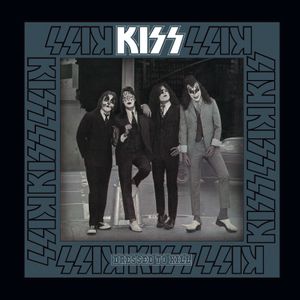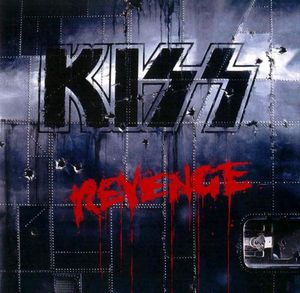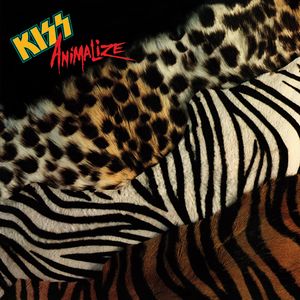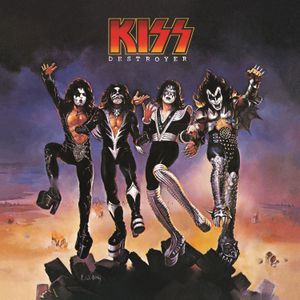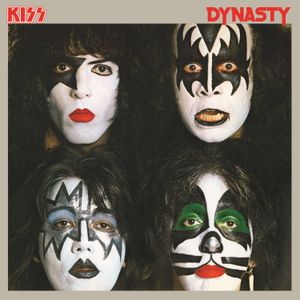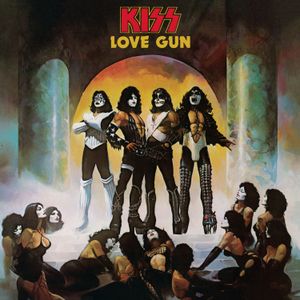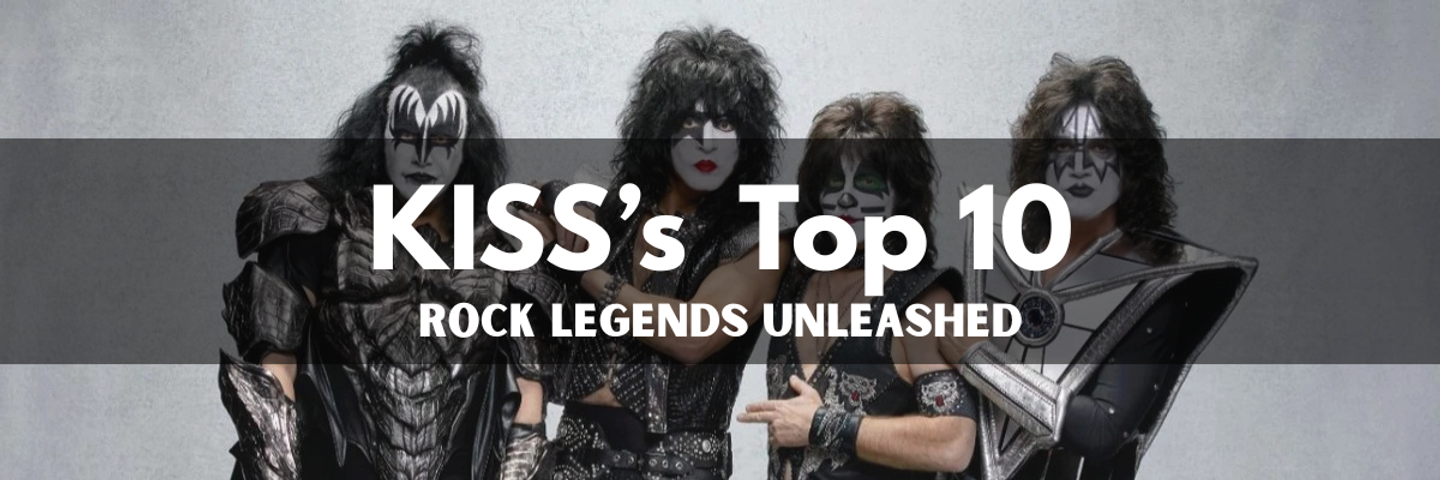
Rock Legends Unleashed: Kiss’s Top 10 Iconic Anthems
Listen on Spotify
Kiss: The Unmasking of Rock's Greatest Showmen
Kiss, often stylized as KISS, emerged from the gritty streets of New York City in 1973. The band's founding members, Paul Stanley (vocals, rhythm guitar), Gene Simmons (vocals, bass guitar), Ace Frehley (lead guitar, vocals), and Peter Criss (drums, vocals), were driven by a vision: to create a spectacle that would redefine rock 'n' roll.
Their trademark face paint and outrageous stage costumes, combined with their explosive, "shock rock" live performances, quickly propelled them to stardom in the mid-1970s. Their iconic characters – The Starchild (Stanley), The Demon (Simmons), The Spaceman (Frehley), and The Catman (Criss) – captured the imaginations of a generation, cementing Kiss' status as one of America's most successful and influential rock bands.
However, creative differences eventually led to the departure of Criss in 1980 and Frehley in 1982. Their replacements, Eric Carr (the Fox) and Vinnie Vincent (the Ankh Warrior), injected fresh energy into the band, but the early 1980s saw their commercial success wane.
In a bold move, Kiss decided to shed their masks and costumes in 1983, entering a new "unmasked" era. This period, which lasted until 1996, saw the band's musical style evolve while still retaining their signature hard rock sound. Despite numerous lineup changes, with Tommy Thayer (lead guitar, vocals) and Eric Singer (drums, vocals) taking the stage later, Kiss continued to tour and record, proving their enduring legacy.
From their early days as a glam rock phenomenon to their later hard rock evolution, Kiss has always pushed boundaries and challenged the status quo. Their impact on music and pop culture remains undeniable, inspiring generations of artists and fans alike. Kiss stands as a testament to the power of spectacle, innovation, and the enduring spirit of rock 'n' roll.
Dive into the electrifying world of Kiss, the iconic American rock band whose theatrical performances and unforgettable anthems shaped rock history. From high–voltage anthems to heartfelt ballads, discover the top 10 Kiss songs that define their legendary career.
Selection Criteria
These songs were selected based on cultural impact, musical innovation, streaming popularity, and their significance in the band's discography.
The Top 3
Rock and Roll All Nite
Dressed to Kill • 1975Undeniably the ultimate Kiss anthem, Rock and Roll All Nite defined the band’s ethos: high energy, audience participation, and unrestrained fun. Originally released in 1975 as part of the live album Alive!, the track soared to No. 12 on the Billboard Hot 100 and remains synonymous with Kiss’s legacy. Its simple, shout–along chorus turned stadiums into massive singalongs, cementing Kiss’s reputation as the world’s most legendary live act. Anecdotes abound of fans camping overnight to be first in line to chant “I wanna rock and roll all night!” Today, the song is an enduring party staple and the closing highlight of countless Kiss performances.
God Gave Rock ’N’ Roll to You II
Revenge • 1991A modern rock anthem and powerful cover of Argent’s classic, Kiss’s version of God Gave Rock ’N’ Roll to You II became a rallying cry in the early ’90s. Released in July 1991 on the Revenge album, the track peaked at No. 21 on the Mainstream Rock chart and featured Gene Simmons’s thundering bass and Paul Stanley’s soaring vocals. Filmed during the band’s hotly–anticipated reunion with original members on MTV’s Stone Age Reunion, the song reinvigorated Kiss’s career post–comeback. Its uplifting message—rock music as a unifying force—resonates today, making it a perennial favorite at shows and sporting events.
Heaven’s On Fire
Animalize • 1984Marking Kiss’s ’80s comeback, Heaven’s On Fire fused glam metal sheen with infectious melody. Released in July 1984, the track peaked at No. 11 on Billboard’s Mainstream Rock chart. Gene Simmons took lead vocals—his first since Beth—injecting the song with a snarling attitude and memorable chorus. The accompanying video became an MTV staple, featuring the band without makeup and introducing guitarist Mark St. John. Heaven’s On Fire showcased Kiss’s adaptability in a competitive rock landscape, proving their anthemic songwriting transcended decades.
Honorable Mentions
Detroit Rock City
A twisting tale of tragedy and perseverance, Detroit Rock City features one of Kiss’s most iconic intros: a revving motorcycle engine leading into a dual–guitar assault. Released in late 1976, the track became a cornerstone of classic–rock radio and a highlight of Kiss’s live set. The song’s storyline—a fan’s fatal car crash en route to a concert—adds dramatic flair. Producer Bob Ezrin’s layered production and Ace Frehley’s blistering lead work elevate the track to epic status. Detroit Rock City endures as a testament to the band’s ability to fuse narrative songwriting with hard–rock power.
I Was Made For Lovin’ You
Blending disco pulse with rock guitar, I Was Made For Lovin’ You signaled Kiss’s late–’70s experimentation. Released in September 1979, the track reached No. 11 on the Billboard Hot 100 and dominated dance floors internationally. Paul Stanley’s sultry vocals and Ace Frehley’s infectious riff proved Kiss could adapt to changing musical landscapes. Though divisive among some hard rock fans, the song expanded Kiss’s audience and demonstrate their versatility. Solos were often omitted live in favor of extended dance breakdowns, creating memorable concert moments. Today, it remains one of their most streamed tracks on digital platforms.
Love Gun
Title track of their 1977 hit album, Love Gun captures Kiss’s unapologetic rock fandom and sexual energy. With Paul Stanley’s charismatic vocals leading a galloping riff, the song became a signature during the band’s Love Gun Tour, complete with pyrotechnics and Simmons’s fire breathing. Love Gun cemented the group’s place in rock lore. It cracked the Top 30 on the Billboard charts and remains a cornerstone of classic–rock radio. Anecdotally, the album cover—with each member pointing a weapon—reinforced Kiss’s rebellious image, making Love Gun an enduring icon.
Beth
Beth stands out as Kiss’s most unexpected hit: a tender piano ballad sung by drummer Peter Criss. Released as a single in September 1976, it shocked rock purists but climbed to No. 7 on the Billboard Hot 100. Beth’s success showcased Kiss’s versatility, proving they could deliver emotional depth alongside their signature bombast. The song’s backstory adds to its mystique. Written about Peter’s wife, Beth, the track almost didn’t make the album until fans demanded its release. Today, Beth remains one of the best–selling singles of the ’70s, illustrating Kiss’s ability to cross genre boundaries.
Shout It Out Loud
From the landmark Destroyer album, Shout It Out Loud captures Kiss at their arena–rock peak. With a chant–like chorus and towering guitar work by Ace Frehley, the song embodies the communal spirit of rock concerts. Released in early 1976, the track became their first Top 40 hit in the US and solidified their stadium–filling status. Behind the scenes, producer Bob Ezrin added layered vocal harmonies and orchestral touches, elevating the song’s anthemic quality. Shout It Out Loud’s message—celebrating life’s victories and communal joy—resonated with fans worldwide, making it a timeless singalong classic at Kiss shows and sports arenas.
Deuce
A seminal track from their debut, Deuce showcases Kiss’s ability to blend relentless riffs with catchy hooks. Gene Simmons leads the charge with a trademark snarling vocal line and a bass groove that underpins every punchy guitar chord. Deuce quickly became a live staple, its opening riff serving as a rallying cry for early Kiss concerts. Critically, Deuce highlighted the band’s songwriting prowess. The track’s swaggering energy and dark lyrical undertones hinted at the rock opera sensibilities Kiss would refine on later albums. For collectors, early pressings of the single are coveted memorabilia, a testament to Deuce’s enduring legacy.
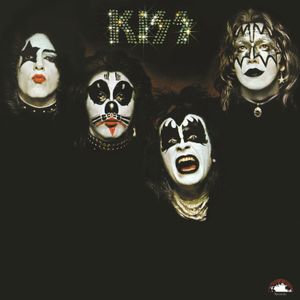
Strutter
Strutter, from Kiss’s 1974 self–titled debut, introduced the world to their raw rock energy and swagger. With its crunchy guitar riff and Paul Stanley’s confident vocals, the song became an instant fan favorite during early live shows. Strutter showcases the band’s chemistry—Ace Frehley’s blues–inflected solo, Peter Criss’s driving drums, and Gene Simmons’s thunderous bass lines—all coalescing into a hard–rocking classic. Beyond its infectious rhythm, Strutter cemented Kiss’s image as rock’s cheeky bad boys. The song’s lyrics celebrate youthful freedom and rebellion, themes that would become Kiss staples. To this day, Strutter remains a go–to track for fans exploring the band’s origins and for new generations discovering Kiss’s foundational sound.
Final Thoughts
From the raw swagger of Strutter to the anthemic power of Rock and Roll All Nite, Kiss’s top 10 songs showcase their unrivaled ability to blend theatricality, hard rock riffs, and unforgettable hooks. These tracks not only defined their career but also left an indelible mark on rock music and pop culture. Whether you’re a lifelong member of the Kiss Army or a new listener, this list is just the beginning—dive deeper into their catalog and experience the spectacle that only Kiss can deliver!
Cultural Impact
Songs that shaped music history and influenced countless artists
Fan Favorites
Tracks with millions of streams and lasting popularity across generations
Watch Related Video
Last Updated: 10/19/2025

